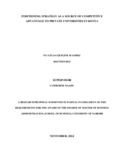| dc.description.abstract | The business environment has become extremely competitive and complex.
Organizations must be flexible in order to adapt to changes, to compete effectively and
thus prosper and grow.A good corporate strategy should therefore integrate an
organization’s goals, policies, and action sequences (tactics) into a cohesive whole, and
must be based on business realities.This is because one of the challenges facing business
entities is choosing and implementing a good response strategy. It therefore means that
effective respond strategies are a major determinant of the organizational performance
and therefore the leadership of the organization should consider it a key duty to set. The
objective of the study was to determine the response strategies adopted by mobile phone
companies in Kenya to changes in the telecommunication industry. The research design
adopted by the study wascross sectional survey design. The population of the study
consisted of all the four mobile phone companies operating in Kenya. The study used
primary data which was collected using self-administered questionnaires. The data was
analyzed using the Statistical Package for Social Sciences (SPSS) software and presented
using tables and figures. The study established that the there are changes that have taken
place in the telecommunication industry and these changes included technological,
customer preference, decrease in the interconnectivity charges, changes in socio-cultural
dynamics, tax regime changes, financial regulations,increased cost of network
infrastructure and consumer protection laws. The companies responded to the changes
through information technology, marketing, change management, leadership and culture
and restructuring. The response by the companies resulted in development new products,
services, processes and capabilities that give a business a strategic advantage over the
competitive forces, improve productivity and reduce costs, communicating with its
clients and staff, respond to competition pressures without delays, nurture key themes or
dominant values that reinforce the competitive advantages, shape the culture to fit with
opportunities and challenges.The study concludes that the major positioning strategies
used as a competitive advantage to private universities are cost leadership and quality of
service to remain competitive.
Positioning strategies that have been adopted by the private universities enables them to
reduce operational cost, improve student loyalty, increase student population, increase
revenue and increase student numbers. | en_US |

